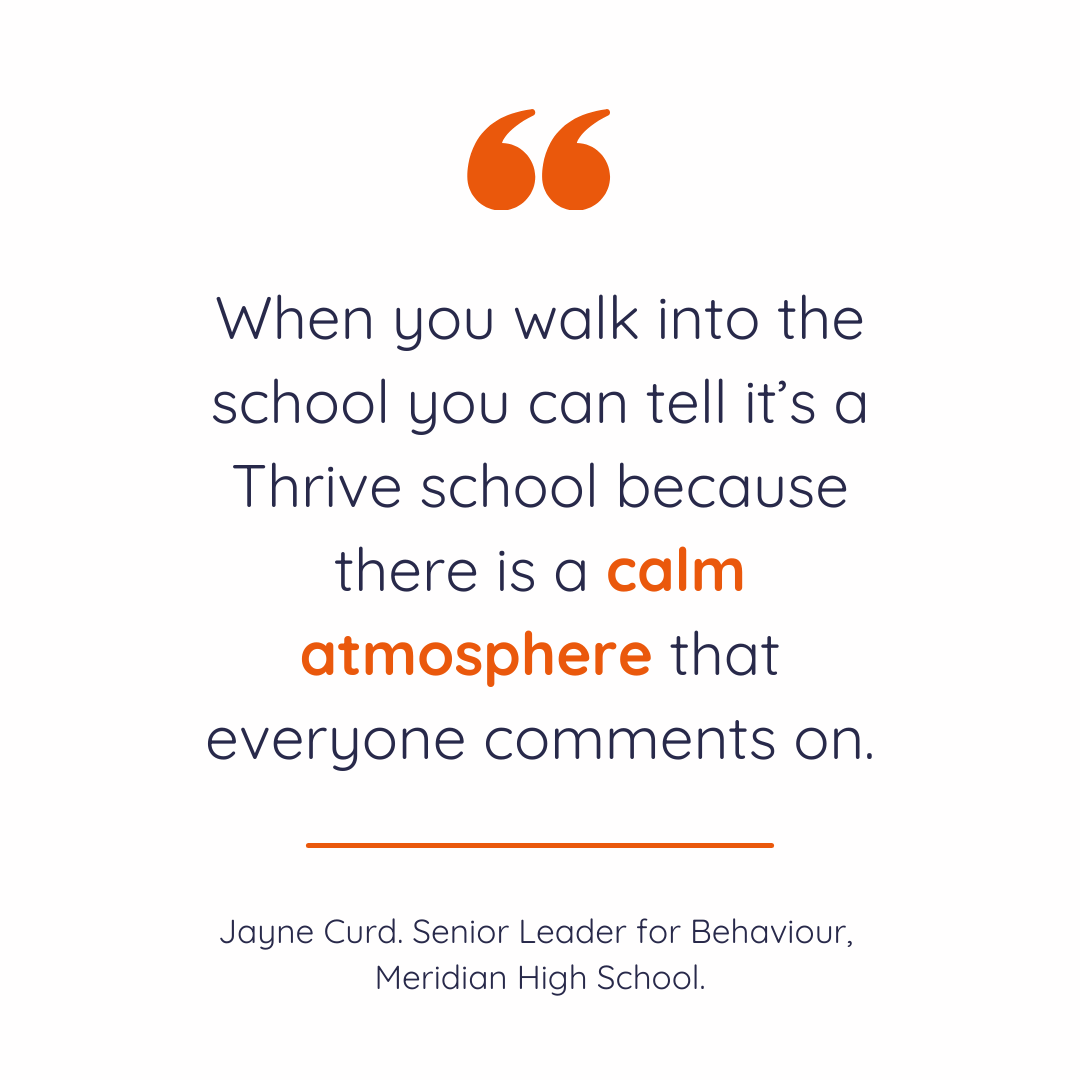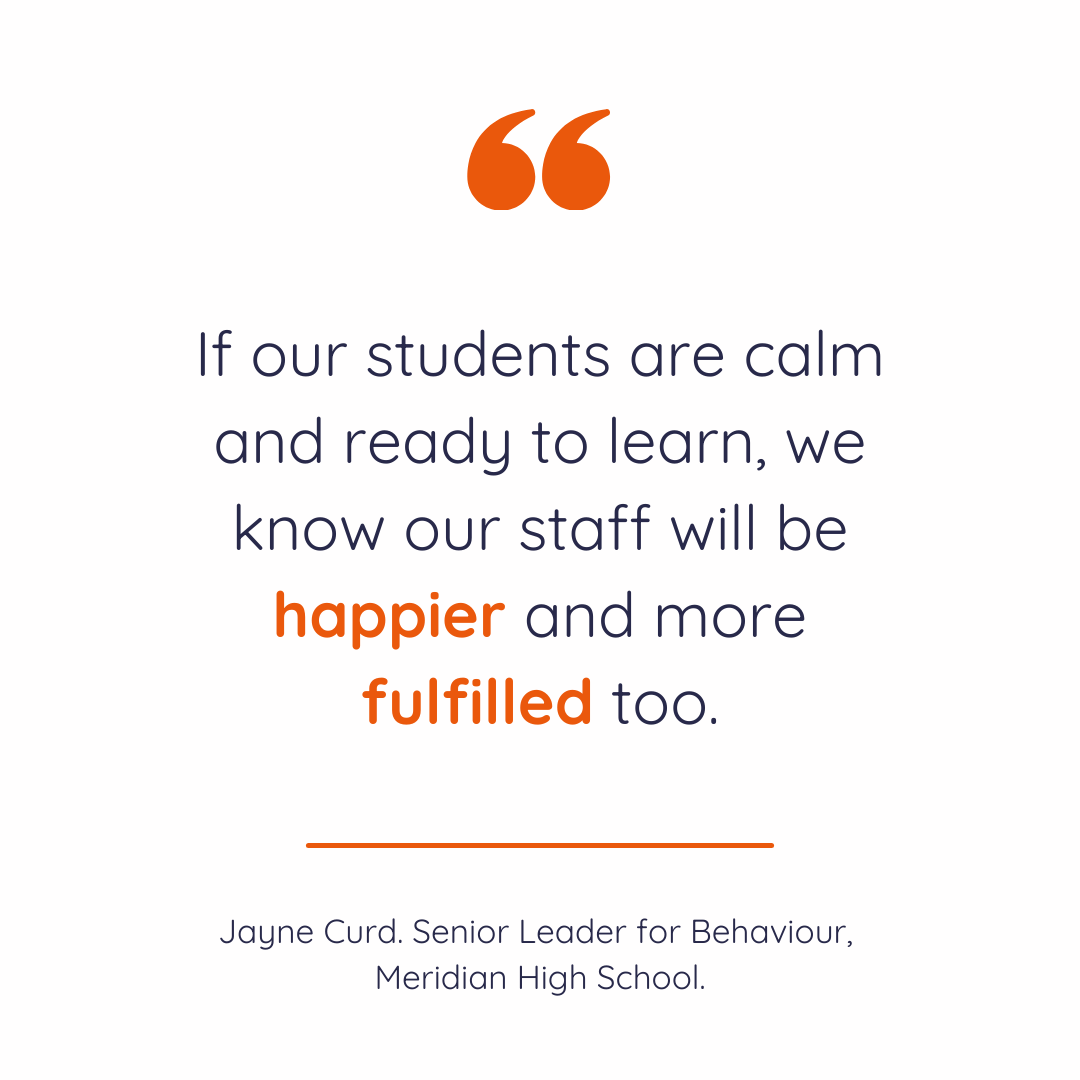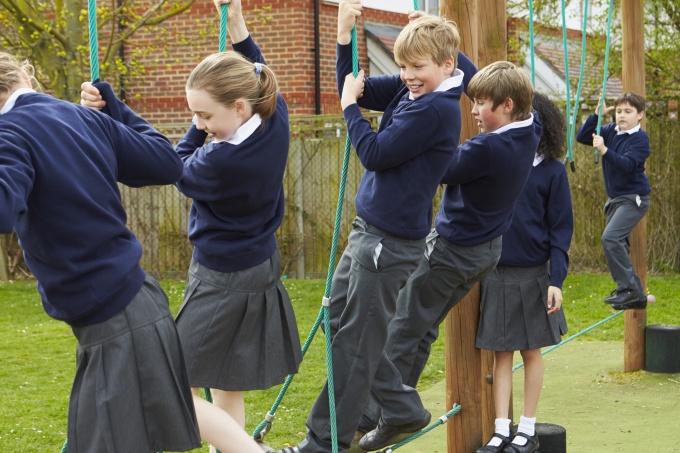Meridian High School is based in a close-knit but disadvantaged community in Croydon and is part of GLF Schools, a growing multi-academy trust of 43 schools. It has above average numbers of pupils with special educational needs and disabilities and 66 per cent of pupils are in receipt of the pupil premium.
Some of the school’s 600 pupils have complex needs and the leadership team felt that a conventional approach of rewards and sanctions wasn’t working. A colleague within the MAT recommended Thrive as an effective solution, and so Meridian started their journey by training two Thrive Licensed Practitioners.
Getting the school community on board
To begin implementing Thrive, the Licensed Practitioners held weekly behaviour and SEND drop in sessions for staff to discuss behaviour and ask questions about potential solutions. This helped to get the wider staff community on board as they realised that they were not alone and that many staff members were having the same struggles.
This process helped the Licensed Practitioners identify which pupils were most in need of support and where to focus their efforts. As the Licensed Practitioners started to make progress with these pupils, more staff throughout the school wanted to get involved with Thrive.
“I always say a lot of our students are hard-wired and, with Thrive, we are able to reconnect that wiring to make it softer. When we change the way we are with them, it changes the response we get from them. When you walk into the school you can tell it’s a Thrive school because there is a calm atmosphere that everyone comments on,” said Jayne Curd, Senior Leader for Behaviour.
Communication helps difficult situations
Communication between staff is facilitated by a regular Thrive report which recognises which students are doing well and which need more support. This also gives staff and the students themselves strategies about how to respond to problematic situations so that they are de-escalated, with the teacher and student focused on finding a solution together. This report is shared with all staff so that everyone is aware of the latest updates and the strategies that have been recommended.
“This is something that has worked really well to embed Thrive across the whole school because it helps to keep everyone informed about what’s going on and it helps students to find their own solution to problems,” said Jayne.
Meridian has a social, emotional and mental health (SEMH) provision which includes a Thrive room and a sensory room. This is also the setting for a Thrive breakfast club which has recently been started. This helps children to start the day feeling connected and safe so that they can get ready to learn. It also helps staff to identify the young people that may need a little extra help that day or who may be feeling unsteady in their emotions.

Every classroom in the school has a poster detailing Thrive’s Vital Relational Functions (VRFs) to help keep them fresh in teachers’ minds. They also have strategies on how to respond to difficult situations laminated on their desks. TV monitors around the school show Thrive-based messages around communication and relationships so that there are constant reminders for staff and young people.
“The messages are everywhere so everyone remembers to stay focused on communication and relationships,” said Jayne.
Leading from the front
SLT support has been key to Meridian’s journey with Thrive. Four of the school’s top team have undergone Thrive training for senior leaders and all staff are expected to model Thrive language. The school now has seven Licensed Practitioners. Its heads of year serve as pastoral leaders and do not have teaching responsibilities. Instead, they are on call every day to help support students and teachers, with an emphasis on mediation. They use the Thrive Approach to meet whatever emotional need the student is communicating so that they can return to the classroom and continue with their learning.
“We use Thrive to identify what the barrier is and the strategies it suggests help us to remove that barrier, whatever it is, so that pupils can go back to the classroom ready to learn,” said Jayne.
As a result, Meridian has seen an increase in the number of pupils engaging with learning and an increase in the number of pupils who will seek out a trusted adult to help them when they need it. The Thrive Approach is used in personal, social, health and economic (PSHE) education sessions but is also referenced across the wider curriculum. For example, in science lessons pupils make models of the brain which help them to understand their emotions and how they react to things.
“You hear some of our children say things like ‘do you want to borrow my adult thinking brain?’ as they learn about what is going on in their brains. We see them able to take on more responsibility, to have ownership over their actions and to make more positive choices,” said Jayne.
High expectations
Jayne says that Thrive’s assessment and monitoring tool, Thrive-Online, has been ‘really useful’ to evidence pupils’ need and the progress they are making against age-appropriate development goals.
While Thrive helps the school to take a nurturing and positive approach to behaviour, Jayne said it had helped students to meet the high expectations the school had of each pupil.
“Children are expected to meet the expectations we have for them and they are individually-supported to help them in this. For children to achieve the attainment they are capable of, they need to be in school and engaging with their education. What Thrive allows us to do is to build a relationship with a trusted adult. Once you get that, children will attain,” she said.
“Thrive has enabled us to identify the barriers to learning that pupils have and to remove them. It has improved the culture for staff because teachers want to teach - they don’t want to have to manage pupils that are disrupting a lesson. If our students are calm and ready to learn, we know our staff will be happier and more fulfilled too,” she said.

Embedding the Thrive Approach also helped the school to respond to the Covid-19 pandemic. Although pupils were impacted by the disruptions to learning and anxiety around the pandemic, having the Approach meant that Meridian had a framework in place to identify and meet pupils’ mental health needs.
“When our students came back you could see the impact it had had on their social and emotional development. You could definitely see they had regressed. Thrive gave us confidence and reassurance that we had something in place to help them and it has definitely done that,” said Jayne.
‘You're never on your own’
Meridian’s Thrive journey has also been helped by ongoing support from the Thrive team as well as a peer support network that is facilitated by social media groups and regular online meet ups to share best practice, ask questions or to simply chat about a difficult day.
“You’re never on your own. Someone is always available to help you if you have a question,” said Jayne.
Thrive School of Excellence
To recognise the extraordinary impact Meridian is having on its pupils and the wider community, the school has been named as a Thrive School of Excellence. The award is the highest level of achievement in Thrive’s Ambassador School scheme, which shines a light on settings showcasing outstanding mental health and wellbeing support.
“If children’s emotional wellbeing is nurtured then they will be able to learn effectively, and the rest will follow. Through adopting the Thrive Approach we are not only enabling our young people to succeed educationally but teaching them skills that will be with them for life,” said Headteacher Amy Anderson.
.jpg)
Pupils celebrated the achievement by welcoming dignitaries including Lord O’Shaughnessy, the Mayor of Croydon and representatives from the local authority to see first-hand the welcoming and calm atmosphere that pervades the school. Visitors were given a tour of the school by Meridian’s Thrive Ambassadors. There is one Ambassador per year group at the school and children apply for the role, explaining why they would like to get involved.
“Thrive has helped me to manage my emotions. I can now regulate myself and I can use the strategies that I have learned to help other students who might find it difficult. Being a Thrive Ambassador means I can support students who may be having struggles with their emotional wellbeing,” said one Thrive Ambassador.
Join over 75,000 educators transforming attendance, behaviour and attainment
If you’ve been inspired by Meridian High School and are ready to join the 75,000+ educators already impacting the lives of children and young people, click below to schedule a Discovery Call with a member of the team.
Designed to fit in around your schedule, these free 30-minute conversations via Teams give you a chance to have your questions answered and decide if our service is a fit for your needs.
Pass it on
Small actions can lead to a big ripple effect. If you enjoyed this post or found it helpful, please consider supporting us in our mission to help every child and young person feel safe, supported and ready to learn by sharing it using the social media buttons below.
Want to join a like-minded community of senior leaders and classroom staff benefitting from insights and strategies to improve attendance, behaviour and attainment? Add your email address below. (It’s easy to unsubscribe).


_680.jpg)
_680.jpg)

(7)_680.jpg)